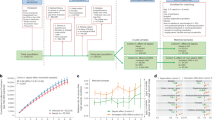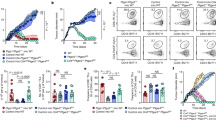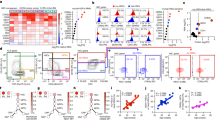Abstract
The contribution of host-derived growth factors to tumour growth in vivo was studied using the transplantable murine mammary carcinoma, MT1, grown in syngeneic mice. Promotion of growth of the mammary carcinoma by a factor(s) from the host was evident in experiments in which the carcinoma cells were inoculated intraperitoneally. In this environment, tumours develop as multiple solid nodules, each probably arising from an individual cell or a small cluster of cells. Tumour growth was found to occur in the peritoneal cavity following inoculation of 10(3) cells, but an inoculum of as few as ten cells grew if a leucocyte-rich exudate had first been induced. To determine which host-derived growth factors might contribute to growth of MT1, extracts of the tumour were first examined for growth factor activity. Fractionation of tumour extracts by either ion-exchange chromatography or gel filtration revealed several peaks of mitogenic activity, but none of this could be attributed to epidermal growth factor (EGF). Accordingly, an anti-EGF antibody was tested as a putative inhibitor of tumour growth as any effect of this antibody could be ascribed to removal of EGF derived from the host. The antibody was found to have potent anti-tumour activity when tested against MT1 tumours that had been inoculated into the peritoneal cavity. In contrast, the antibody had little effect on growth of the discrete tumour mass which formed when MT1 was transplanted subcutaneously. The results suggest that host-derived EGF contributes to establishment of microcolonies of MT1 carcinoma within the peritoneal cavity. This may be directly, by providing growth factors to supplement those produced by the tumour until it reaches a certain critical mass to sustain autocrine growth, or indirectly, by affecting the production of other growth-stimulatory factors or cytokines.
This is a preview of subscription content, access via your institution
Access options
Subscribe to this journal
Receive 24 print issues and online access
$259.00 per year
only $10.79 per issue
Buy this article
- Purchase on Springer Link
- Instant access to full article PDF
Prices may be subject to local taxes which are calculated during checkout
Similar content being viewed by others
Author information
Authors and Affiliations
Rights and permissions
About this article
Cite this article
Davies, D., Farmer, S., White, J. et al. Contribution of host-derived growth factors to in vivo growth of a transplantable murine mammary carcinoma. Br J Cancer 70, 263–269 (1994). https://doi.org/10.1038/bjc.1994.290
Issue Date:
DOI: https://doi.org/10.1038/bjc.1994.290
This article is cited by
-
Systemic Effects of Surgery: Quantitative Analysis of Circulating Basic Fibroblast Growth Factor (bFGF), Vascular Endothelial Growth Factor (VEGF) and Transforming Growth Factor Beta (TGF-β) in Patients with Breast Cancer Who Underwent Limited or Extended Surgery
Breast Cancer Research and Treatment (2005)



